中考英语形容词和副词用法总结
2023年中考英语语法笔记:形容词与副词
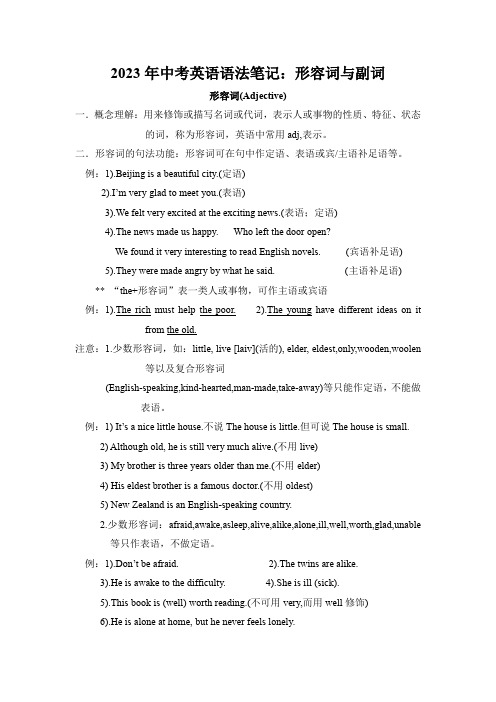
2023年中考英语语法笔记:形容词与副词形容词(Adjective)一.概念理解:用来修饰或描写名词或代词,表示人或事物的性质、特征、状态的词,称为形容词,英语中常用adj,表示。
二.形容词的句法功能:形容词可在句中作定语、表语或宾/主语补足语等。
例:1).Beijing is a beautiful city.(定语)2).I’m very glad to meet you.(表语)3).We felt very excited at the exciting news.(表语;定语)4).The news made us happy. Who left the door open?We found it very interesting to read English novels. (宾语补足语)5).They were made angry by what he said. (主语补足语)** “the+形容词”表一类人或事物,可作主语或宾语例:1).The rich must help the poor. 2).The young have different ideas on it from the old.注意:1.少数形容词,如:little, live [laiv](活的), elder, eldest,only,wooden,woolen 等以及复合形容词(English-speaking,kind-hearted,man-made,take-away)等只能作定语,不能做表语。
例:1) It’s a nice little house.不说The house is little.但可说The house is small.2) Although old, he is still very much alive.(不用live)3) My brother is three years older than me.(不用elder)4) His eldest brother is a famous doctor.(不用oldest)5) New Zealand is an English-speaking country.2.少数形容词:afraid,awake,asleep,alive,alike,alone,ill,well,worth,glad,unable等只作表语,不做定语。
中考英语语法---形容词和副词
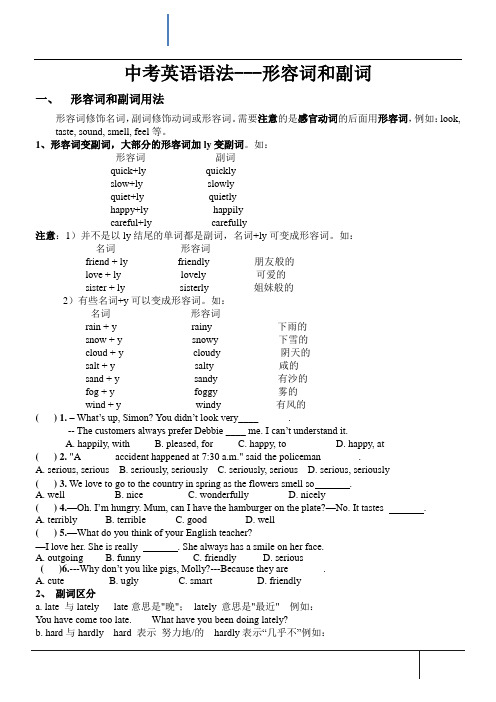
中考英语语法---形容词和副词一、形容词和副词用法形容词修饰名词,副词修饰动词或形容词。
需要注意的是感官动词的后面用形容词,例如:look, taste, sound, smell, feel等。
1、形容词变副词,大部分的形容词加ly变副词。
如:形容词副词quick+ly quicklyslow+ly slowlyquiet+ly quietlyhappy+ly happilycareful+ly carefully注意:1)并不是以ly结尾的单词都是副词,名词+ly可变成形容词。
如:名词形容词friend + ly friendly 朋友般的love + ly lovely 可爱的sister + ly sisterly 姐妹般的2)有些名词+y可以变成形容词。
如:名词形容词rain + y rainy 下雨的snow + y snowy 下雪的cloud + y cloudy 阴天的salt + y salty 咸的sand + y sandy 有沙的fog + y foggy 雾的wind + y windy 有风的( ) 1.–What’s up, Simon? You didn’t look very____ .-- The customers always prefer Debbie ____ me. I can’t understand it.A. happily, withB. pleased, forC. happy, toD. happy, at( ) 2. "A ______ accident happened at 7:30 a.m." said the policeman _______.A. serious, seriousB. seriously, seriouslyC. seriously, seriousD. serious, seriously( ) 3. We love to go to the country in spring as the flowers smell so .A. wellB. niceC. wonderfullyD. nicely( ) 4.—Oh. I’m hungry. Mum, can I have the hamburger on the plate?—No. It tastes .A. terriblyB. terribleC. goodD. well( ) 5.—What do you think of your English teacher?—I love her. She is really . She always has a smile on her face.A. outgoingB. funnyC. friendlyD. serious( )6.---Why don’t you like pigs, Molly?---Because they are ______ .A. cuteB. uglyC. smartD. friendly2、副词区分a. late 与lately late意思是"晚";lately 意思是"最近" 例如:You have come too late. What have you been doing lately?b. hard与hardly hard 表示努力地/的hardly表示―几乎不‖例如:he works hard. I can hardly finish it in a week.c. close与closely close意思是"近";closely 意思是"仔细地" 例如:He is sitting close to me. Watch him closely.d. deep与deeply deep意思是"深"表示空间深度;deeply时常表示感情上的深度,"深深地" 例如:He pushed the stick deep into the mud. Even father was deeply moved by the movie.e. high与highly high表示空间高度;highly表示程度,相当于much 例如The plane was flying high. I think highly of your opinion.f. wide与widely wide表示空间宽度;widely意思是"广泛地","在许多地方" 例如:He opened the door wide. English is widely used in the world.( ) 1 Mingming got up very _______,so he came to school half an hour ______.te; latelyB. lately; lateC. lately; latelyD. late; late二、形容词与副词的原级、比较级和最高级1、形容词和副词有比较级和最高级的变化大多数形容词(性质形容词)和副词有比较级和最高级的变化,即原级、比较级和最高级,用来表示事物的等级差别。
中考英语语法讲解课件-形容词与副词

• • Байду номын сангаас • • • • • • •
Please tell me where the shoes shop is? Please tell me where the shoe shop is. [1误] [析] 在用名词作修饰词来修饰另一名词时,这个作修 饰词的名词应用单数形式,如: a shoe shop 鞋店 a fruit shop 水果店 a book shop 书店 a post office 邮局 a police station 警察局 a bus stop 汽车站
• 特殊形容词的问题 • 一: 和an/ a 连用 判断具体是 还是 an 连用, 判断具体是a还是 • __ ugly man; __ usual person; __ unusual person; • 二: 特殊形容词 只用于表语 不能用于定语 特殊形容词:只用于表语 只用于表语,不能用于定语 ill; ready; sure; alike; asleep; awake; alive…; • 三:长得像副词的形容词 长得像副词的形容词---ly, 长得像副词的形容词 • Friendly友好的 ugly丑陋的 lovely可爱 友好的; 丑陋的; 友好的 丑陋的 可爱 可能的; 的; likely可能的 lonely孤独的 可能的 孤独的
好的问题
• • • • • • • • Good—well---kind adj 善良的; Sb be good at某人擅长做 Sb do well in某人擅长做 Sb be kind to sb某人对另外一个人好 例:It is very kind __ you to help me. Of/ to/ for The __ lady is __ to her grandchildren Kind; well/ well; kind/ good; kind/ kind; kind
中考英语形容词,副词知识点
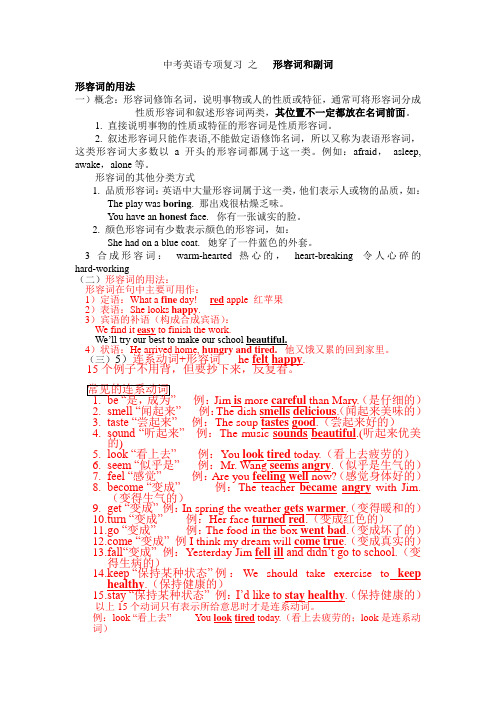
中考英语专项复习之形容词和副词形容词的用法一)概念:形容词修饰名词,说明事物或人的性质或特征,通常可将形容词分成性质形容词和叙述形容词两类,其位置不一定都放在名词前面。
1. 直接说明事物的性质或特征的形容词是性质形容词。
2. 叙述形容词只能作表语,不能做定语修饰名词,所以又称为表语形容词,这类形容词大多数以a开头的形容词都属于这一类。
例如:afraid,asleep, awake,alone等。
形容词的其他分类方式1. 品质形容词:英语中大量形容词属于这一类,他们表示人或物的品质,如:The play was boring. 那出戏很枯燥乏味。
You have an honest face. 你有一张诚实的脸。
2. 颜色形容词有少数表示颜色的形容词,如:She had on a blue coat. 她穿了一件蓝色的外套。
3 合成形容词:warm-hearted 热心的,heart-breaking 令人心碎的hard-working(二)形容词的用法:形容词在句中主要可用作:1)定语:What a fine day! red apple 红苹果2)表语:She looks happy.3)宾语的补语(构成合成宾语):We find it easy to finish the work.We’ll try our best to make our school beautiful.4)状语:He arrived home, hungry and tired.他又饿又累的回到家里。
(三)5)连系动词+形容词he felt happy.15个例子不用背,但要抄下来,反复看。
例:Jim is more careful than Mary.(是仔细的)2.smell “闻起来”例:The dish smells delicious.(闻起来美味的)3.taste “尝起来”例:The soup tastes good.(尝起来好的)4.sound “听起来”例:The music sounds beautiful.(听起来优美的)5.look “看上去”例:You look tired today.(看上去疲劳的)6.seem “似乎是”例:Mr. Wang seems angry.(似乎是生气的)7.feel “感觉”例:Are you feeling well now?(感觉身体好的)8.become “变成”例:The teacher became angry with Jim.(变得生气的)9.get “变成”例:In spring the weather gets warmer.(变得暖和的)10.t urn “变成”例:Her face turned red.(变成红色的)11.g o “变成” 例:The food in the box went bad.(变成坏了的)12.c ome “变成”例I think my dream will come true.(变成真实的)13.f all“变成”例:Yesterday Jim fell ill and didn’t go to school.(变得生病的)14.k eep “保持某种状态”例:We should take exercise to keephealthy.(保持健康的)15.s tay “保持某种状态”例:I’d like to stay healthy.(保持健康的)以上15个动词只有表示所给意思时才是连系动词。
中考英语形容词副词复习
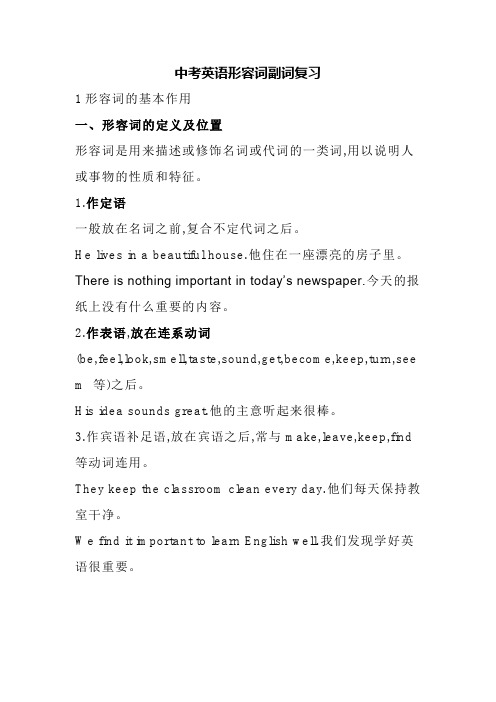
中考英语形容词副词复习1形容词的基本作用一、形容词的定义及位置形容词是用来描述或修饰名词或代词的一类词,用以说明人或事物的性质和特征。
1.作定语一般放在名词之前,复合不定代词之后。
He lives in a beautiful house.他住在一座漂亮的房子里。
There is nothing important in today’s newspaper.今天的报纸上没有什么重要的内容。
2.作表语,放在连系动词(be,feel,look,smell,taste,sound,get,become,keep,turn,see m 等)之后。
His idea sounds great.他的主意听起来很棒。
3.作宾语补足语,放在宾语之后,常与make,leave,keep,find 等动词连用。
They keep the classroom clean every day.他们每天保持教室干净。
We find it important to learn English well.我们发现学好英语很重要。
4.形容词的名词化有些形容词放在定冠词之后变成名词,表示一类人,常见的有:good/bad,rich/poor,young/old,deaf/blind,black/white,livi ng/dead等The old should be taken good care of.老年人应该受到很好的照顾。
2形容词词义辨析中考主要在完形中考查形容词词义辨析。
学生在做辨析题时,首先应读懂句意,抓住题干中关键信息,并分析各选项表达的意思,结合日常生活的常识及语境即可选出正确答案。
如:After the football match, the players were very ______ and tired.A. cool B. full C. lively D. thirsty方法点拨第1步:分析四个选项均为形容词,在句中作表语;第2步:分析语境“在足球比赛之后,运动员是_____和疲劳的。
2024年九年级中考英语一轮复习形容词副词原级比较级最高级中考高频考点总结(讲义)

2024届九年级中考英语一轮复习【语法专题】形容词副词原级、比较级、最高级中考高频考点总结(讲义)九年级英语教研室整理(1)形容词、副词原级的用法①“…甲+be+as+形容词原级+as+乙…甲+动词+as+副词原级+as+乙表示“甲与乙在……方面程度相同”。
如: My best friend is as tall as her mother.我最好的朋友和她妈妈一样高。
Mary runs as slowly as Lucy.玛丽和露西跑得一样慢。
特别注意当as…as…前面是be动词时,as…as中间用形容词原级。
当as…as…的前面是动词时,as…as中间用副词原级。
②“甲+be+not+as/so+形容词原级+as+乙甲+助动词+not+动词原形+as/so+副词原级+as+乙”表示“甲在某方面不如乙…”。
如: This red skirt is not so beautiful as that blue one.这条红色的裙子不如那条蓝色的漂亮。
He doesn't do homework as carefully as Jim.他做作业没有吉姆那么认真。
③表示…有多长(宽、高、深等)用基数词+度量单位+形容词The Yellow River is 5,464 kilometers long.黄河有5,464千米长。
(2)形容词、副词比较级的用法①比…长(宽,高等)多少倍…基数词+times +比较级+than…如:Our school is three times bigger than theirs.我们学校是他们学校的三倍大。
是…的几倍…基数词+times as+形容词或副词原级+as…如:Our school is three times as big as theirs.我们学校是他们学校的三倍大。
②用原级形式表示比较级意思。
“甲+be+not+as/so+形容词原级+as+乙”表示“甲在某方面不如乙…”。
中考英语形容词与副词复习
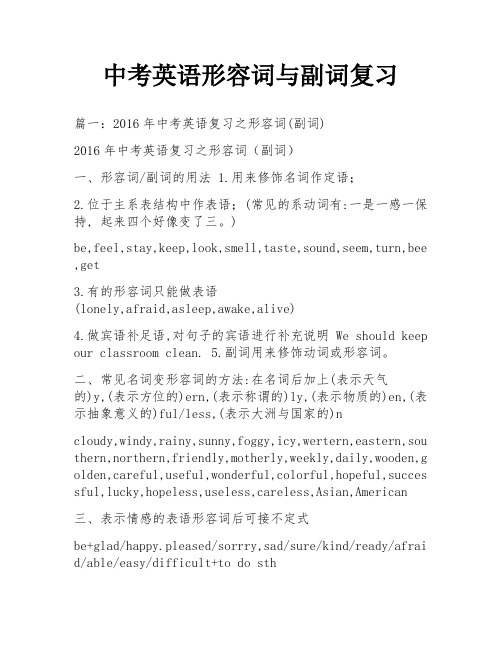
中考英语形容词与副词复习篇一:2016年中考英语复习之形容词(副词)2016年中考英语复习之形容词(副词)一、形容词/副词的用法 1.用来修饰名词作定语;2.位于主系表结构中作表语;(常见的系动词有:一是一感一保持, 起来四个好像变了三。
)be,feel,stay,keep,look,smell,taste,sound,seem,turn,bee ,get3.有的形容词只能做表语(lonely,afraid,asleep,awake,alive)4.做宾语补足语,对句子的宾语进行补充说明 We should keep our classroom clean.5.副词用来修饰动词或形容词。
二、常见名词变形容词的方法:在名词后加上(表示天气的)y,(表示方位的)ern,(表示称谓的)ly,(表示物质的)en,(表示抽象意义的)ful/less,(表示大洲与国家的)ncloudy,windy,rainy,sunny,foggy,icy,wertern,eastern,sou thern,northern,friendly,motherly,weekly,daily,wooden,g olden,careful,useful,wonderful,colorful,hopeful,succes sful,lucky,hopeless,useless,careless,Asian,American三、表示情感的表语形容词后可接不定式be+glad/happy.pleased/sorrry,sad/sure/kind/ready/afrai d/able/easy/difficult+to do sth四、形容词(副词)比较级、最高级的构成(一)以er,ow,ble,ple,y结尾的双音节词和单音节词:①一般在词尾直接加er或est; ②以不发音的e结尾的, 在词尾加r 或st;③以“辅音字母+y”结尾,先把y变为i,再加er或est; ④.以重读闭音节结尾,且末尾只有一个辅音字母的,双写末尾的辅音字母,再加er/est.fat,thin,sad,hot,big,red,wet.(二)末尾不是以er,ow,ble,ple,y结尾的双音节词和所有多音节词直接在单词前加more/most; (三)以-ly结尾的副词和以-ing/-ed结尾的形容词直接在单词前加more/most; (四)不规则变化(good/well,many/much,bad/badly/ill,little,far,old)good/well-better-best many/much-more/most little-less-leastbad/badly/ill-worse-worst far-farther/further-farthest/furthest old-older/elder-oldest/eldest五、形容词/副词原级的用法1.可以用quite,very,so,too,enough修饰原级;2. as+原级+as3. not+as/so+原级+as4.甲是乙的几倍(甲+is+倍数+as…as+乙)This bridge is three times as long as that one. Your room is twice as large as mine.六、形容词/副词比较级的用法 1.than是比较级的标志词2.句中出现两个比较对象或含两个人/物时,用比较级;3. much,far,even,a little,a lot,a bit常用于比较级之前;4.Which/Who+比较级,A or B?5.甲+be+the+比较级+of the two(甲是两者中较…的)6.甲+be+比较级+than+any other+单数名词(甲比其它的任何一个都…)7.倍数+比较级+than(表示几倍于) This classroom is two times bigger than that one. 8.比较级+and+比较级(越来越…)a.单音节词和以er,ow,ble,ple,y结尾的双音节词:比较级+and+比较级 b.部分双音节词和多音节词:more and more+多音节词原形 9.the+比较级……,the+比较级……(越……,就越……)七、形容词/副词最高级的用法 1.the 是最高级的标志词;2.句中出现≥3个比较对象时,用最高级;3.句中出现of all,of the three,that I have ever seen 时,用最高级;4.Which/Who+is+the+最高级,甲、乙or 丙?5.表示最……之一,要用“one of+the+形容词最高级+复数名词+表示范围的介词短语”6.序数词后的形容词一般要用最高级(表示第几最……) The Yello w River is the second longest river in China.7.形容词最高级前一般要加the,但若最高级前出现了形容词性物主代词或名词所有格形式,则不再用the.8.副词最高级前一般不用定冠词the.翻译下列短语和句子:1.越来越胖2.越来越漂亮3.越来越热4.越来越无聊5.越来越瘦6.越来越高兴7.越来越生气8.越来越饿9.越来越伤心10.越来越冷 11.越来越大12.越来越粗心 13.越来越早 14.越来越多15.越来越好 16.越来越危险17.越来越少18.越来越疲惫19.你越认真,你犯的错误就越少。
英语中考语法复习——形容词和副词

英语中考语法复习——(五)形容词和副词中考考点一:形容词作表语和定语形容词作表语位于系动词(be 、become 、get 、feel 、look 、sound 、smell 、taste 等)之后。
作定语时,一般位于被修饰词之前,但修饰复合不定代词(someone 、somebody 、anyone 、something 等)需位于被修饰词之后。
中考考点二:副词作状语修饰动词助动词之后,行为动词之前He is never late. He often helps others. 有时也可位于句末He treats others nicely. 修饰形容词 副词+形容词 It is very hot today. 修饰句子副词+全句Luckily, he passed the exam.( )In the library, students are required to keep ____ and move ______.A. quiet; quietB. quiet; quietlyC. quietly; quietD. quietly; quietly形容词+名词 a beautiful girl数词+形容词 six thousand kilometers long 复合不定代词+形容词 something important 系动词+形容词She looks beautiful.中考考点三:形容词、副词的原级( )1. —What do you think of English?—I think English is as _____ as Chinese.A. usefulB. more usefulC. the most useful( )2.Wang Wei speaks English as ____as Yang Lan. They both study English hard.A. goodB. wellC. betterD. best中考考点三:形容词、副词的比较级和最高级的构成A.规则变化B.不规则变化中考考点五:形容词、副词的比较级用法A.常见的修饰形容词比较级的词a little; a bit; a little bit; even; much; far; rather( )1.--It's raining heavily. —The radio says it will be ____ worse tomorrow.A. veryB. quiteC. tooD. much( )2. —How are you today, Tom? —I'm even_______.A. worseB. badlyC. betterD. wellB. 形容词、副词常考点( )1.Study hard! ______ you study, ______ results you'll get.A. Harder; betterB. The harder; better.C. The harder; the betterD. Harder; the better.( )2. Our country is getting _______.A. more and more strongB. strong and strongC. stronger中考考点六:形容词、副词的最高级A.常考句型:the+最高级+of/in…( )1. The hotel is very old. It's one of ______ buildings in the city. [北京卷]A. oldB. olderC. oldestD. the oldest( )2. China is developing ________ of all the countries in the world.[潍坊卷]A. fastB. fasterC. fastestD. the most fastB.比较级表示最高级·比较级+than+any other+可数名词单数=比较级+than+(all) the other+可数名词复数经典例句:1. He is taller than any other student of Class Three. 他比三班的其他同学都更高。
初中英语中考语法形容词和副词总结归纳
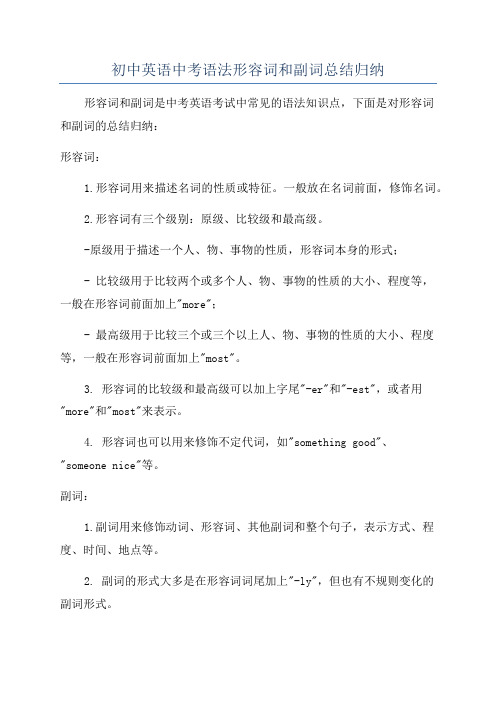
初中英语中考语法形容词和副词总结归纳形容词和副词是中考英语考试中常见的语法知识点,下面是对形容词和副词的总结归纳:形容词:1.形容词用来描述名词的性质或特征。
一般放在名词前面,修饰名词。
2.形容词有三个级别:原级、比较级和最高级。
-原级用于描述一个人、物、事物的性质,形容词本身的形式;- 比较级用于比较两个或多个人、物、事物的性质的大小、程度等,一般在形容词前面加上"more";- 最高级用于比较三个或三个以上人、物、事物的性质的大小、程度等,一般在形容词前面加上"most"。
3. 形容词的比较级和最高级可以加上字尾"-er"和"-est",或者用"more"和"most"来表示。
4. 形容词也可以用来修饰不定代词,如"something good"、"someone nice"等。
副词:1.副词用来修饰动词、形容词、其他副词和整个句子,表示方式、程度、时间、地点等。
2. 副词的形式大多是在形容词词尾加上"-ly",但也有不规则变化的副词形式。
3. 副词有原级和比较级,形式和形容词的比较级一样,可以在副词前面加上"more"来表示。
注意事项:1.形容词和副词的比较级和最高级要根据词的性质和词尾变化,不是所有形容词和副词都可以直接加上字尾来表示比较级和最高级。
2.形容词和副词的用法、位置和修饰的词性有一定的规律,需要具体问题具体分析。
以上是对初中英语中考语法中形容词和副词的总结归纳,希望能够帮助到你。
中考英语语法-形容词和副词

heaviest busiest
most important most beautiful
【不规则变化】
原级
比较级
最高级
good/well
better
best
bad/ill/badly
worse
worst
many/much
more
most
little
less
least
older(较老的,较旧的,
old
作表语
及物动词本身意义不完整,需要接宾语意义才能够完整。 2.作表语的副词,大多数表示位置或者状态,如:out, in, on, back, down, up, off, away, upstairs, downstairs等。 He is in. What’s on this evening? I must be off now.
(1)以-ing结尾的形容词表示主动意义,一般修 饰事物,表示事物的特征或性质,如 interesting,surprising, exciting, frightening,amazing,worrying等。
年纪较大的)
elder(一般用于比较家 人的年龄长幼较年长的,
oldest(年级最大的) eldest(最年长的)
或表示资格老的)
faபைடு நூலகம்ther(较远距离上的
far
远)
farthest(最远)furthest
further(进一步程度
(最大限度)
上的远)
具体用法
一,比较级的用法 1,表示两者间进行比较时,用形容词和副词比较级, 结构为“A……+比较级+than+B”。
It is much colder today than yesterday.
中考英语--形容词、副词的原级、比较级用法总结

中考英语--形容词、副词的原级、比较级用法总结形容词/副词原级、比较级原级(表示人/物自身的情况时,或者同级比较时用原级)例如:The flower is very beautiful.这朵花跟漂亮。
Lily is as old as Cathy.Lily 和Cathy一样大。
原级的句型:主语+系动词(be动词)+as +形容词原级+as ...主语+实义动词+as +副词原级+as...(和...一样...)例如:Tom is as tall as Lily.Tom和Lily一样高。
Tom runs as quickly as Lily.Tom和Lily跑得一样快。
否定句.. not as/so + 形容词/副词原级+as... (前者不如后者... ) =... less + 形容词/副词原级+than ...例如:Tom isn’t as tall as Lily.Tom不如Lily高。
Tom doesn’t run as quickly as Lily.Tom不如Lily跑得快。
常见的修饰形容词/副词原级的程度副词:very, too, so, quite, enough等。
例如:The weather in Chongqing is very hot in summer.夏天,重庆的天气非常热。
比较级(用于两者之间的比较,用来表示“前者比后者更……”)例如:Tom is taller than his brother.Tom比他的弟弟更高。
Tom runs faster than his brother.Tom比他的弟弟跑得更快。
1. 形容词/副词的比较级变化:规则变化:(1)一般在词尾直接加er。
例如:tall-taller,long-longer(2)以不发音的字母e结尾的单词在词尾直接加r。
例如:nice-nicer,cute-cuter(3)以辅音字母+y结尾的词,把y变为i,再加er。
中考形容词、副词用法小结
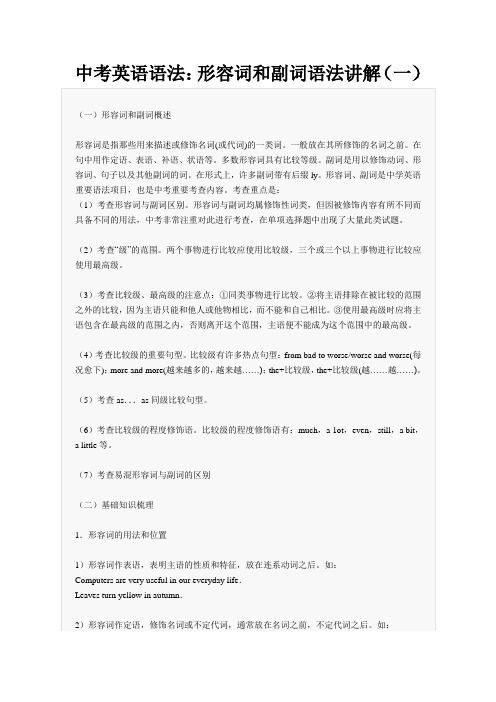
注:副词的最高级前the可以省略。
5.学习比较等级时的—些注意事项
1)比较的对象应当一致。如:
It's hotter in Guangzhou than Beijing.(误)
(2)地点副词。常用的有:here,there,up,down,above,below,inside,outside等。
(3)疑问副词。常见的有:where,when,why,how等。
(4)程度副词。常见的有:very,much,so,too,quite,enough等。
(5)方式副词。多由“形容词+ly”后缀构成。如:carefully,quickly,easily,quietly等。
pleased more pleased most pleased
3)不规则变化:
good/well better best
bad/ill/badly worse worst
many/much more most
little less least
far farther/further farthest/furthest
(4)考查比较级的重要句型。比较级有许多热点句型:from bad to worse/worse and worse(每况愈下);more and more(越来越多的,越来越……);the+比较级,the+比较级(越……越……)。
(5)考查as...as同级比较句型。
(6)考查比较级的程度修饰语。比较级的程度修饰语有:much,a 1ot,even,still,a bit,a little等。
中考英语形容词和副词
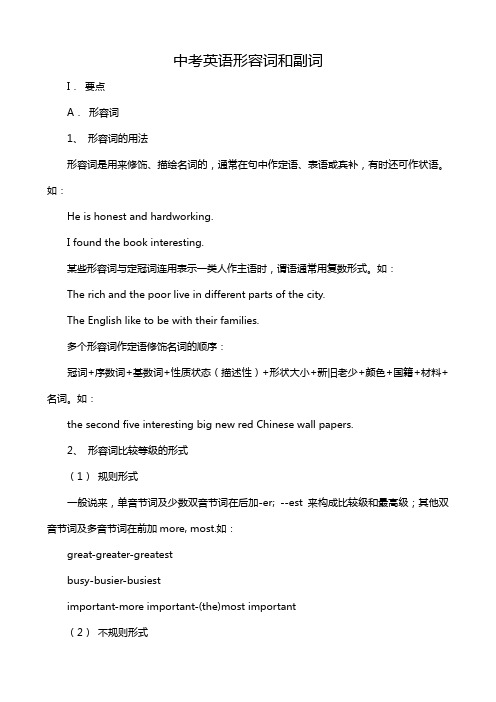
中考英语形容词和副词I.要点A.形容词1、形容词的用法形容词是用来修饰、描绘名词的,通常在句中作定语、表语或宾补,有时还可作状语。
如:He is honest and hardworking.I found the book interesting.某些形容词与定冠词连用表示一类人作主语时,谓语通常用复数形式。
如:The rich and the poor live in different parts of the city.The English like to be with their families.多个形容词作定语修饰名词的顺序:冠词+序数词+基数词+性质状态(描述性)+形状大小+新旧老少+颜色+国籍+材料+名词。
如:the second five interesting big new red Chinese wall papers.2、形容词比较等级的形式(1)规则形式一般说来,单音节词及少数双音节词在后加-er; --est 来构成比较级和最高级;其他双音节词及多音节词在前加more, most.如:great-greater-greatestbusy-busier-busiestimportant-more important-(the)most important(2)不规则形式good (well)-better-bestbad (ill)-worse-worstmany (much)-more-mostlittle-less-least(3)形容词比较等级的用法①表示两者的比较,用形容词的比较级+than. 如:He is cleverer than the other boys.This one is more beautiful than that one.②表示两者以上的比较,用"the +形容词最高级(+名词)+of(in) …"如:He is the cleverest boy in his class.③表示两者是同等程度,用"as +形容词原级+as". 如:He is as tall as I.I have as many books as you.④越…越…例如:The more I learn, the happier I am.⑤You can never be too careful. 越小心越好又如:You can never praise the teacher too highly.你怎么赞扬这个老师也不过分。
中考英语语法复习 形容词、副词
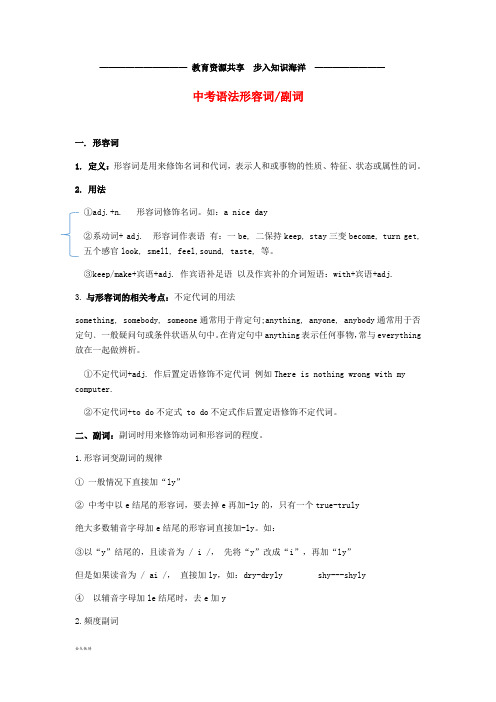
——————————教育资源共享步入知识海洋————————中考语法形容词/副词一. 形容词1. 定义:形容词是用来修饰名词和代词,表示人和或事物的性质、特征、状态或属性的词。
2. 用法①adj.+n. 形容词修饰名词。
如:a nice day②系动词+ adj. 形容词作表语有:一be, 二保持keep, stay三变become, turn get, 五个感官look, smell, feel,sound, taste, 等。
③keep/make+宾语+adj. 作宾语补足语以及作宾补的介词短语:with+宾语+adj.3.与形容词的相关考点:不定代词的用法something, somebody, someone通常用于肯定句;anything, anyone, anybody通常用于否定句﹑一般疑问句或条件状语从句中。
在肯定句中anything表示任何事物,常与everything 放在一起做辨析。
①不定代词+adj. 作后置定语修饰不定代词例如There is nothing wrong with my computer.②不定代词+to do不定式 to do不定式作后置定语修饰不定代词。
二、副词:副词时用来修饰动词和形容词的程度。
1.形容词变副词的规律①一般情况下直接加“ly”②中考中以e结尾的形容词,要去掉e再加-ly的,只有一个true-truly绝大多数辅音字母加e结尾的形容词直接加-ly。
如:③以“y”结尾的,且读音为 / i /,先将“y”改成“i”,再加“ly”但是如果读音为 / ai /,直接加ly,如:dry-dryly shy---shyly④以辅音字母加le结尾时,去e加y2.频度副词频度副词never, seldom, sometimes, often, usually, always从不,很少,有时,经常,通常,总是。
这些词都是表示频率的词,一般在句中作状语。
中考英语语法复习讲义之形容词与副词三个级别的用法
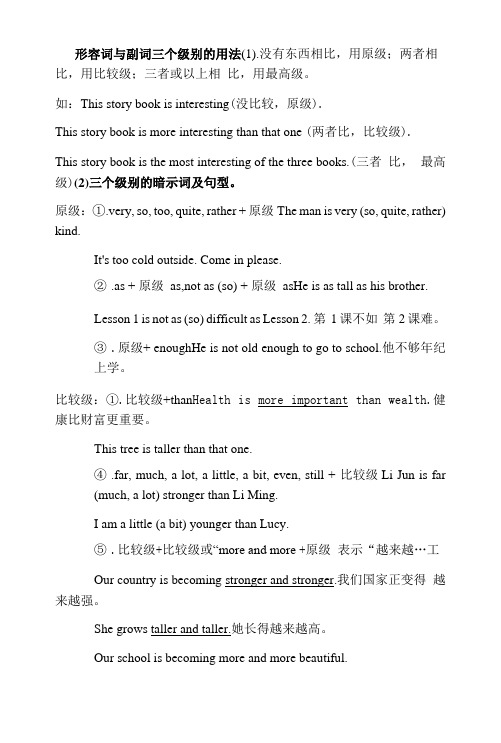
形容词与副词三个级别的用法(1).没有东西相比,用原级;两者相比,用比较级;三者或以上相比,用最高级。
如:This story book is interesting(没比较,原级).This story book is more interesting than that one (两者比,比较级).This story book is the most interesting of the three books.(三者比,最高级)(2)三个级别的暗示词及句型。
原级:①.very, so, too, quite, rather + 原级The man is very (so, quite, rather) kind.It's too cold outside. Come in please.②.as + 原级as,not as (so) + 原级asHe is as tall as his brother.Lesson 1 is not as (so) difficult as Lesson 2. 第1 课不如第2课难。
③.原级+ enoughHe is not old enough to go to school.他不够年纪上学。
比较级:①.比较级+than Health is more important than wealth.健康比财富更重要。
This tree is taller than that one.④.far, much, a lot, a little, a bit, even, still + 比较级Li Jun is far(much, a lot) stronger than Li Ming.I am a little (a bit) younger than Lucy.⑤.比较级+比较级或“more and more +原级表示“越来越…工Our country is becoming stronger and stronger.我们国家正变得越来越强。
中考英语词汇之形容词和副词
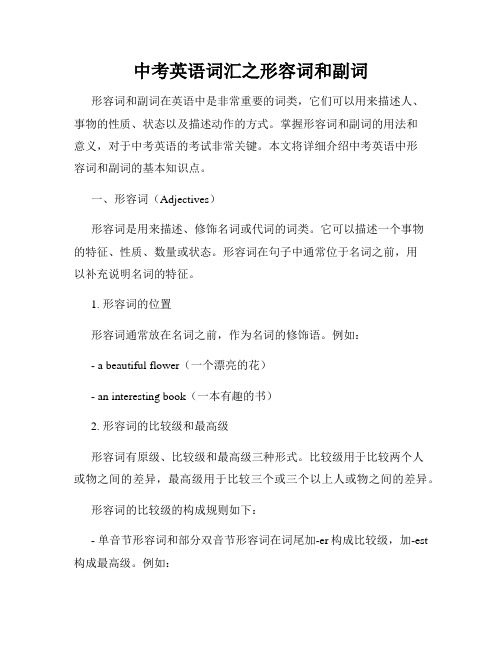
中考英语词汇之形容词和副词形容词和副词在英语中是非常重要的词类,它们可以用来描述人、事物的性质、状态以及描述动作的方式。
掌握形容词和副词的用法和意义,对于中考英语的考试非常关键。
本文将详细介绍中考英语中形容词和副词的基本知识点。
一、形容词(Adjectives)形容词是用来描述、修饰名词或代词的词类。
它可以描述一个事物的特征、性质、数量或状态。
形容词在句子中通常位于名词之前,用以补充说明名词的特征。
1. 形容词的位置形容词通常放在名词之前,作为名词的修饰语。
例如:- a beautiful flower(一个漂亮的花)- an interesting book(一本有趣的书)2. 形容词的比较级和最高级形容词有原级、比较级和最高级三种形式。
比较级用于比较两个人或物之间的差异,最高级用于比较三个或三个以上人或物之间的差异。
形容词的比较级的构成规则如下:- 单音节形容词和部分双音节形容词在词尾加-er构成比较级,加-est 构成最高级。
例如:- small(小的)- smaller(更小的)- smallest(最小的)- tall(高的)- taller(更高的)- tallest(最高的)- 以字母“e”结尾的形容词,在词尾加-r构成比较级,加-st构成最高级。
例如:- brave(勇敢的)- braver(更勇敢的)- bravest(最勇敢的)- 以辅音字母+y结尾的形容词,将y变为i,再加-er构成比较级,加-est构成最高级。
例如:- happy(幸福的)- happier(更幸福的)- happiest(最幸福的)形容词的最高级的构成规则如下:- 单音节和部分双音节形容词在词尾加-est构成最高级。
- 大部分双音节或多音节形容词在前面加most构成最高级。
3. 常见形容词的用法形容词可以用于修饰人物、事物的外貌、特征、品质等。
例如:- beautiful(漂亮的),表示外貌美丽。
例如:a beautiful girl(一个漂亮的女孩)- tall(高的),表示身材高大。
中考英语形容词和副词用法总结
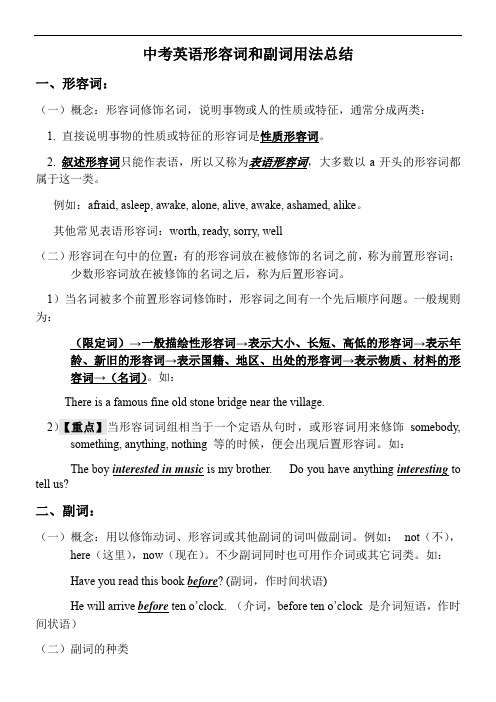
中考英语形容词和副词用法总结一、形容词:(一)概念:形容词修饰名词,说明事物或人的性质或特征,通常分成两类:1. 直接说明事物的性质或特征的形容词是性质形容词。
2. 叙述形容词只能作表语,所以又称为表语形容词,大多数以a开头的形容词都属于这一类。
例如:afraid, asleep, awake, alone, alive, awake, ashamed, alike。
其他常见表语形容词:worth, ready, sorry, well(二)形容词在句中的位置:有的形容词放在被修饰的名词之前,称为前置形容词;少数形容词放在被修饰的名词之后,称为后置形容词。
1)当名词被多个前置形容词修饰时,形容词之间有一个先后顺序问题。
一般规则为:(限定词)→一般描绘性形容词→表示大小、长短、高低的形容词→表示年龄、新旧的形容词→表示国籍、地区、出处的形容词→表示物质、材料的形容词→(名词)。
如:There is a famous fine old stone bridge near the village.2)【重点】当形容词词组相当于一个定语从句时,或形容词用来修饰somebody, something, anything, nothing 等的时候,便会出现后置形容词。
如:The boy interested in music is my brother. Do you have anything interesting to tell us?二、副词:(一)概念:用以修饰动词、形容词或其他副词的词叫做副词。
例如:not(不),here(这里),now(现在)。
不少副词同时也可用作介词或其它词类。
如:Have you read this book before? (副词,作时间状语)He will arrive before ten o’clock. (介词,before ten o’clock 是介词短语,作时间状语)(二)副词的种类1、时间副词:1)表示发生时间的副词:It’s beginning to rain now! 现在开始下雨了!2)表示频繁程度的副词,也称频度副词:always, often, usually, sometimes, never, ever, hardly等一般位于系动词、情态动词和助动词之后,实义动词之前: She often changes her mind.3)还有一些其他表示时间的副词:He has just had an operation. 他刚动过手术。
中考英语语法汇总专题复习(四)形容词与副词
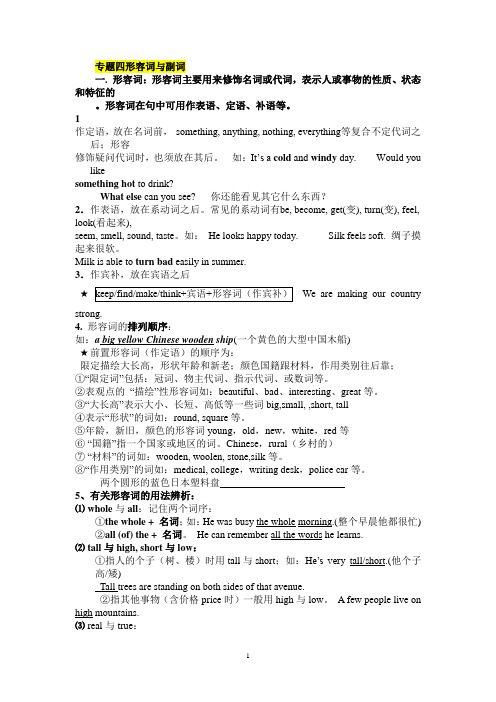
专题四形容词与副词一. 形容词:形容词主要用来修饰名词或代词,表示人或事物的性质、状态和特征的。
形容词在句中可用作表语、定语、补语等。
1作定语,放在名词前,something, anything, nothing, everything等复合不定代词之后;形容修饰疑问代词时,也须放在其后。
如:It’s a cold and windy day. Would you likesomething hot to drink?What else can you see? 你还能看见其它什么东西?2.作表语,放在系动词之后。
常见的系动词有be, become, get(变), turn(变), feel, look(看起来),seem, smell, sound, taste。
如:He looks happy today. Silk feels soft. 绸子摸起来很软。
Milk is able to turn bad easily in summer.3.作宾补,放在宾语之后★We are making our country strong.4.形容词的排列顺序:如:a big yellow Chinese wooden ship(一个黄色的大型中国木船)★前置形容词(作定语)的顺序为:限定描绘大长高,形状年龄和新老;颜色国籍跟材料,作用类别往后靠;①“限定词”包括:冠词、物主代词、指示代词、或数词等。
②表观点的“描绘”性形容词如:beautiful、bad、interesting、great等。
③“大长高”表示大小、长短、高低等一些词big,small, ,short, tall④表示“形状”的词如:round, square等。
⑤年龄,新旧,颜色的形容词young,old,new,white,red等⑥“国籍”指一个国家或地区的词。
Chinese,rural(乡村的)⑦“材料”的词如:wooden, woolen, stone,silk等。
2024年九年级中考英语+形容词和副词复习课件

early 早的;早 late迟的;晚
例如:The stone is hard.(形容词这个石头是硬的)
He studies hard.(副词)努力地
副词的分类
副词按词汇意义可分为方式副词、程度副词、地点副词、时间副词、 频度副词、否定副词和疑问副词等。 方式副词:well,fast,slowly,carefully,quickly 地点副词:here,there,out,somewhere,home 时间副词:today,yesterday,soon,now,then,recently,still 频度副词:always,often,usually,sometimes,seldom,never 否定副词:no,not,neither,nor 疑问副词:where,how,why,when
slow→slowly
careful→carefully final→finally
2. 如果形容词以-y结尾,变副词时要将y变为i,再加上-ly
例如:angry→angrily
happy→happily heavy→heavily
easy→easily
lucky→luckily
busy→busily
1. Don't worry, sir. I'm sure I can run A to catch up with them.
A.fast enough B.enough fast C. slowly enough D. enough slowly
2. I like this book very much because it is C to read
• The story is very interesting. 这个故事很有趣。 • The man is very interesting. 这个人很有趣。
2024中考英语形容词和副词用法总结
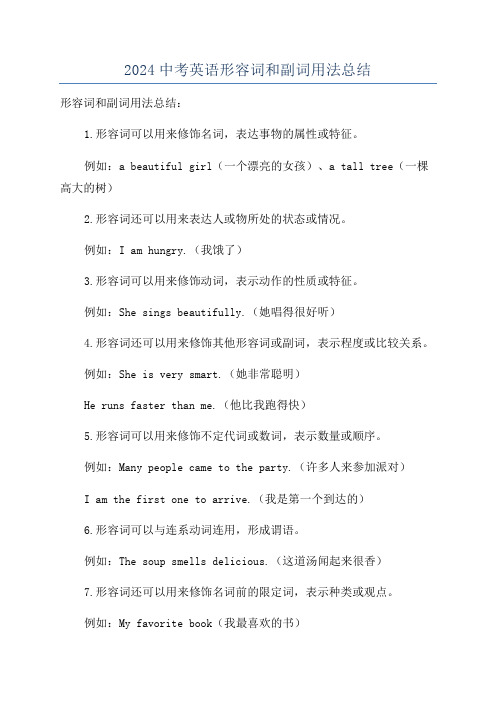
2024中考英语形容词和副词用法总结形容词和副词用法总结:1.形容词可以用来修饰名词,表达事物的属性或特征。
例如:a beautiful girl(一个漂亮的女孩)、a tall tree(一棵高大的树)2.形容词还可以用来表达人或物所处的状态或情况。
例如:I am hungry.(我饿了)3.形容词可以用来修饰动词,表示动作的性质或特征。
例如:She sings beautifully.(她唱得很好听)4.形容词还可以用来修饰其他形容词或副词,表示程度或比较关系。
例如:She is very smart.(她非常聪明)He runs faster than me.(他比我跑得快)5.形容词可以用来修饰不定代词或数词,表示数量或顺序。
例如:Many people came to the party.(许多人来参加派对)I am the first one to arrive.(我是第一个到达的)6.形容词可以与连系动词连用,形成谓语。
例如:The soup smells delicious.(这道汤闻起来很香)7.形容词还可以用来修饰名词前的限定词,表示种类或观点。
例如:My favorite book(我最喜欢的书)8.副词可以修饰动词、形容词或其他副词,表示动作的方式、程度或时间等。
例如:He speaks English fluently.(他流利地说英语)She is very tired.(她非常累)9.副词可以用来修饰整个句子或句子的其中一部分,表示说话人的态度或观点。
例如:Fortunately, we passed the exam.(幸运的是,我们通过了考试)Personally, I think she is right.(就我个人而言,我认为她是对的)需要注意的是,形容词和副词的用法需要根据具体语境和句子结构进行判断,不能一概而论。
同时,形容词和副词的形式有些相似,但其用法和词性是不同的,需要根据具体情况进行准确的用词。
- 1、下载文档前请自行甄别文档内容的完整性,平台不提供额外的编辑、内容补充、找答案等附加服务。
- 2、"仅部分预览"的文档,不可在线预览部分如存在完整性等问题,可反馈申请退款(可完整预览的文档不适用该条件!)。
- 3、如文档侵犯您的权益,请联系客服反馈,我们会尽快为您处理(人工客服工作时间:9:00-18:30)。
形容词和副词用法总结及练习一、形容词:(一)概念:形容词修饰名词,说明事物或人的性质或特征,通常分成两类:1.直接说明事物的性质或特征的形容词是性质形容词。
2.叙述形容词只能作表语,所以又称为表语形容词,大多数以a开头的形容词都属于这一类。
例如:afraid,asleep, awake,alone,alive, awake, ashamed,alike。
其他常见表语形容词:worth,ready, sorry,well(二)形容词在句中的位置:有的形容词放在被修饰的名词之前,称为前置形容词;少数形容词放在被修饰的名词之后,称为后置形容词。
1)当名词被多个前置形容词修饰时,形容词之间有一个先后顺序问题。
一般规则为:(限定词)→一般描绘性形容词→表示大小、长短、高低的形容词→表示年龄、新旧的形容词→表示国籍、地区、出处的形容词→表示物质、材料的形容词→(名词)。
如:There is a famous fine oldstone bridge near thevillage.2)【重点】当形容词词组相当于一个定语从句时,或形容词用来修饰somebody, something, anything, nothing等的时候,便会出现后置形容词。
如:The boy interested inmusic ismybrother. Doyou have anythinginterest ing to tell us?二、副词:(一)概念:用以修饰动词、形容词或其他副词的词叫做副词。
例如: not(不),here(这里),now(现在)。
不少副词同时也可用作介词或其它词类。
如:Have you read this book before?(副词,作时间状语)He willarrive before ten o’clock.(介词,before ten o’clock是介词短语,作时间状语)(二)副词的种类1、时间副词:1)表示发生时间的副词:It’s beginningtorain now!现在开始下雨了!2)表示频繁程度的副词,也称频度副词:always, often, usually, sometimes,never, ever, hardly 等一般位于系动词、情态动词和助动词之后,实义动词之前: She often changes her mind.3)还有一些其他表示时间的副词:Hehas just had an operation. 他刚动过手术。
2、地点副词:1)表示地点的副词:Sheis studyingabroad. 她在国外留学。
2)以where 构成的副词也是地点副词:It’sthesame everywhere. 到处都一样。
3、【重点】方式副词1)英语中有大量方式副词,说明行为方式(回答how的问题):How beautifullyyourwifedances.2)表示情绪的副词:She smiled gratefully.3)还有一些以-ly结尾的副词,表示动作发生的状况:He leftthetown secretly.4、【重点】程度副词和强调副词1)程度副词可修饰动词,表示“到某种程度”:Is she badly hurt? 她伤得重吗?[说明] 这类副词除修饰动词外,还可修饰形容词(a)或另一副词(b):a. fairly simple 相当简单quitecorrect 完全正确it very quickly 干得很快2:oodat singing.b.修饰比较级:Yousingmuch better than me. Their house ismuchnicer thanours.5.【重点】疑问副词和连接副词1)疑问副词: 疑问副词用来引导特殊问句:2)连接副词:连接副词意思和词形都和疑问副词一样,但都引导从句或与不定式连用:how: Do you know howto startthis machine?你知道这台机器怎样启动吗?where: I don’t know wherehe lives. 我不知道他住在哪儿。
(引导宾语从句)6. 一些其它类型的副词,如表示方向的副词: Let’s goinside.Taketwo steps forward.(三)副词的位置1. 副词修饰动词时,通常可以放在句首、句中或句末。
如:Usually I domy homework in the evening.(句首)Ioften getup at six. (句中)ﻩﻩﻩPlease speak slowly.2. 副词修饰形容词或副词时,通常放在形容词或副词的前面如:These flowersarequitebeautiful.(在形容词前) 这些花相当漂亮。
He wy hard.(在副词前)他工作很努力。
▲ :She is oldenough togoto school. (在形容词后)她已到了上学的年龄。
3.,地点状语应放在时间状语之前。
如:We had a meeting in the classroom yesterday afternoon.我们昨天下午在教室开了一个会。
He watched TV at home last night.他昨晚在家看电视。
常见形容词用法比较1.elder 和olderﻩ①elder为"年长的",只指人,用来比较年龄长幼,尤指兄弟姐妹的长幼关系,它只能用在名词前作定语,不能用于than引导的比较状语从句中。
如:Jordan has twoelder brothers and an elder and ayou nger sister.②older为"年龄较大的,较老的,较旧的",可指人,也可指物,作定语或表语,能用在than引导的比较状语从句中。
My elder brother is 7 yearsolder than my younger sister.2.good和wellgood和well都表示"好"。
通常,作定语或表语时用good,作状语时用well;表示"身体好的"用well.Doing sports isgood for us. 做运动对我们有益。
(作表语)Sandydances well and she is a gooddancer. 桑迪舞跳得好,她是个出色的舞者。
(well作状语,good作定语)---How are you?---Iam very well.(作表语,表示"身体好的")3. huge, big,large,和great1) huge强调尺寸、体积"庞大"(指体积时,比large, great所指的体积大),容量和数量"巨大",不强调重量。
Aboutten years ago scientistsfromtheUnited States found that the largeobject caused a huge holein Mexico.2)big最通俗、常用,强调比正常程度、范围及规模的标准大,修饰人、物或数量。
反义词是little或smallMybest friendisXiao Li,but last week in school wehada big fight.3) large强调远远超过标准的"大",可指数量、容量、体积和面积,比big正式,反义词是small.So itis provedthat the large object hada close relationwith the death ofdinosaursand other animals.4)great通常指抽象的事物。
可表数量、距离和程度,修饰人时,意为"伟大的"。
This isa great chancethat manypeople donothave.形容词与介词的搭配在英语中,有很多形容词后需要加特定的介词,构成固定的搭配。
1.与about构成的搭配Beanxious about besorry aboutbe careful about be sure/certain abo ut be worriedabout2.与at构成的搭配Be expert at be surprisedatﻩbe angry at begood atﻩbecleverat3. 与for构成的搭配Be famous/well-known for ﻩ be ready for be sorry for be fit/ unfitforﻩ begood/bad for4.与in构成的搭配Be interested inbe weakin ﻩbe poorinbe different in ﻩbe experienced in5.与of构成的搭配Be afraid of befond of be proudofbe tiredofbe full of beshort of ……ﻩbe ashamedof6.与to构成的搭配Be good/ bad tobe kind toﻩbe niceto berudeto ﻩbe usefulto bepolite to7.与with构成的搭配Be angry with becareful with be busywith besatisfiedwith ﻩﻩbeple ased withbe happy with be patient with be strict with特别提示1.有些形容词后跟不同的介词意义差别不大Beexperienced at/ in具有……方面的经验besure/certain of/ about对……有把握2.有些形容词后跟不同的介词意义不同Begoodat在……方面擅长be good to对……友好be good for 对……有帮助形容词的常用句型1.It's +形容词+ of+sb.+动词不定式"某人(做某事)……",说明"人"的性质或特征。
常用形容词有:good, kind, nice, polite,clever, foolish, lazy,careful,careless,right,wrong等It's very kind of you tohelp me. It's foolish of you tomakesuch mista ke.2. It's+形容词+for + sb.+动词不定式"做某事对某人来说……",说明动词不定式的性质、特征。
